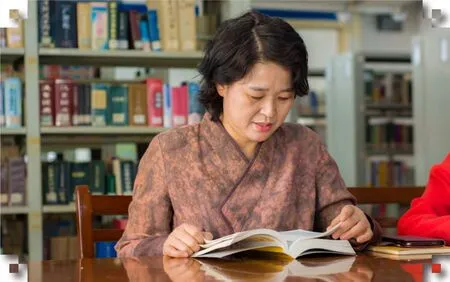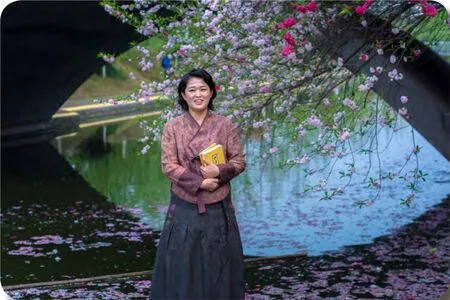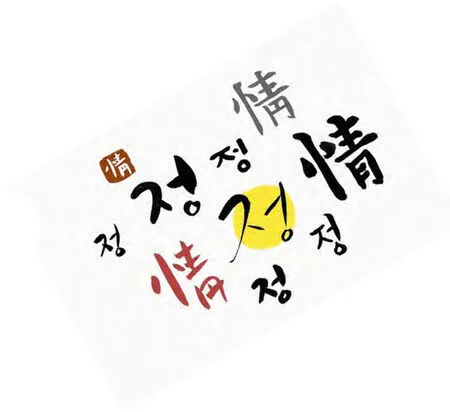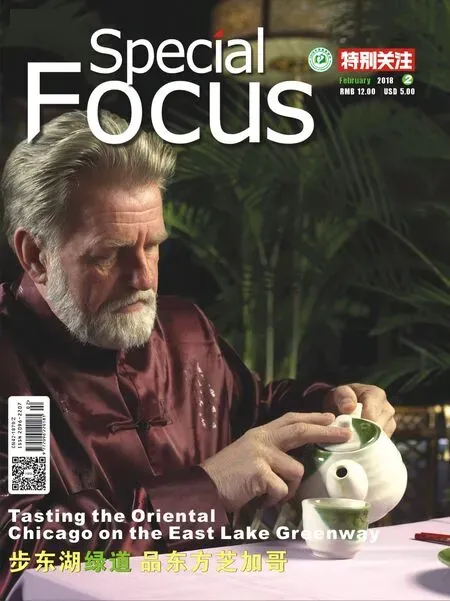A Korean Mother’s Chinese Dream
By Liu Dongli
How would a fifty-yearold housewife who spent a quarter of a century doing housework make use of the rest of her life? Dancing in the park with her peers? Taking walks with her grandchildren? Or perhaps windowshopping at the mall?
A Korean mother named Kang Sun Hee made a shocking decision—to leave Korea and chase her Chinese dream in China.
Kang was born in Gumi City,Gyeongsangbuk-do Province, the hometown of the former president Park Chung Hee. Her father was a huge fan of Chinese culture and language, and was obsessed with Chinese characters. Influenced by her father, Kang Sun Hee started learning how to write Chinese characters when she was in junior high school. In 1985, she was admitted to Chungbuk University,where she majored in Chinese.
After graduation, Kang Sun Hee got married and had children,living a normal life like the other Korean women she knew. She devoted all her life to her family.Unconsciously, 25 years came and went.
Despite time passing by, in the thousands of days and nights she spent as a mother, she never gave up her Chinese dream. She attended private Chinese classes given by the local professors whenever she had time. She learned a lot about classic Chinese literature. Classics like the Great Learning, the Doctrine of the Mean, the Analects of Confucius,Mencius, and Gems from Chinese Culture were treasures to Kang.Time seemed to be fleeting when she immersed herself in these masterpieces.
When her kids all went to college, Kang suddenly was left with just herself to look after.She started to think for herself—why couldn’t she change her role from a mother and wife to an independent individual? After consideration, she made a bold decision: she was going to head to China and learn Chinese.
“What? You will go to college in China?” Kang’s husband and kids were stunned when they learned about the decision.
“Go to college? At your age?”her husband disagreed.
“You should enjoy your life now. Why do you have to make yourself so busy?” the elder son could not understand her.
“You can learn Chinese in Korea. Why do you have to leave home and go to China?” the younger one was unwilling to let his mother go.
年近半百、已在家专心相夫教子25年的家庭主妇,会如何打发自己的晚年时光呢?是和同龄人一起跳广场舞?还是带着孙子逛公园?抑或是冲进商场“抢黄金”?
韩国妈妈康善喜做出的选择让所有人大吃一惊:离开家乡,不远万里来到中国学习汉语!
康善喜出生于韩国前总统朴正熙的家乡庆尚北道龟尾市,父亲是个中国迷,对汉字情有独钟。受家庭影响,康善喜初中、高中时认真学习写汉字,并于1985年进入韩国大邱庆北大学中文系学习。
大学毕业后,康善喜和大多数韩国妇女一样,结婚生子,成为一名全职家庭主妇,专心照顾丈夫和两个孩子的起居生活。这一过,就是25年。
然而,在这近万个日夜中,康善喜心里藏的“汉语梦”,却从来不曾熄灭过。只要有空,她便钻进当地专门教授汉语的私人书堂,学习中国古典文学。手捧着《大学》《中庸》《论语》《孟子》《古文观止》等中国古代经典著作,康善喜视为珍宝。在这些浩瀚的书卷中,康善喜甚至能将时间遗忘……
终于待到两个孩子先后上了大学,丈夫也忙于自己的工作,康善喜似乎一下子“闲”了下来。她开始思考自己的人生——为何不能将自己从“女人”的角色转变成一个“人”的角色。思忖良久,为了心中那个蠢蠢欲动的“汉语梦”,她做了一个大胆的决定:去中国,学汉语!
“什么?你要去中国上学?”当康善喜将这一想法告诉丈夫和孩子后,得到的是三双瞪大的眼睛,还有三张惊讶得合不拢的嘴。
“你都这个年纪了,还要上学吗?”丈夫不同意。
“现在是您享福养老的时候,为什么要那么辛苦?”大儿子不理解。
“就算您要学汉语,在可以在国内学,为什么要舍近求远离开家?”小儿子不舍得。
但康善喜心意已决,义无反顾。
2014年9月,经与三峡大学有合作关系的韩国威德大学中文系成润淑教授推荐,康善喜离开祖国,来到中国湖北,进入三峡大学攻读中文系硕士研究生。在这里,她开始了自己的留学逐梦生活。
这是康善喜第一次来中国。初来乍到,难免各种不适应。三峡大学地处湖北宜昌,冬天又冷又潮,让她怀念家里温暖的地暖;中国饭菜不合胃口,她只好自己动手做泡菜;图书馆的书籍和韩国的放置顺序不一样,想在图书馆查找资料也不熟悉。


However, Kang Sun Hee had made up her mind: she had to pursue her dream.
I n S e p t e m b e r o f 2 0 1 4,recommended by Professor Seong Yoon Suk of the department of Chinese language and culture in Uiduk University, Kang Sun Hee left home and headed for China Three Gorges University in Hubei Province. Seeking a master’s degree in Chinese, she started her study in China.
It was the first time that she had ever come to China and she felt uneasy. In the cold and wet winter in Yichang, she missed her heating at home in Korea. She had to make kimchi by herself because she wasn’t accustomed to the Chinese food. The library was also different from that at home, which made research difficult.
Besides all these troubles,there was another big challenge:communication. Although Kang Sun Hee had learned Chinese, it was still very hard to communicate in a Chinesespeaking country. During conversation, she had to request her partners to slow down so that she could catch up with them.Writing course papers required extensive reading. However it took her about a month to finish reading one Chinese book. What’s worse, the obscure writings in classical Chinese took her even more time and efforts to read and understand.
The uneasiness in life,challenges in study, and isolation from her family brought her great psychological stress. She didn’t even have a friend in China when she arrived. Helplessness and loneliness often hit her at the beginning of her journey in China.However, these did not hamper her from pursuing her dream.
To deal with the cold and wet winter, she put dehumidifiers in every corner of her room and aired out her quilt as often as possible. She even bought many down jackets. When she had trouble using the library resources, she resorted to her Chinese classmates and the librarians. Gradually, she became a regular of the library and befriended several teachers.They helped her to cope with her loneliness and provided plenty of practice speaking Chinese.
Since she was the same age as the mothers of her classmates and also as gentle and nice as their mothers, the students all called her “Mother Kang.”
“I played and ate with them.Some of them even invited me to their homes and I would make Korean cuisine while they made Chinese food. I loved hanging out and communicating with them.”In her interview, “Mother Kang”told the correspondent that she had fallen in love with Chinese food, among which her favorites were steamed stuffed buns and dumplings.
She often talked with her family using WeChat. Noticing her improvement in mood, her husband and sons started to understand her and become more supportive. One of her sons,who was majoring in English in college, also started to be interested in Chinese.
Kang Sun Hee loves traveling and adores her second hometown Yichang. “In Yichang City, you can enjoy the beautiful scenery of The Three Gorges. Many Chinese poets left epic poems of this place and I want my families to learn about that. I want to visit Qu Yuan Temple because I read “Li Sao”and “Tian Wen,” written by the patriotic poet Qu Yuan. I’d also like to visit the historical relics of the Three Kingdoms Culture.”
After graduation, Kang Sun Hee left China for Korea,where she found a job a s a C h i n e s e teacher. She’s also applying for a doctoral program on the Chinese language.Despite all the difficulties she’d had, she never gave up her Chinese dream and now she is spreading the seed of it to more and more people in Korea.◆

(Translation: Yu Lan)
除此之外,最大的挑战还是汉语交流障碍。虽然康善喜曾学过中文,但要在一个完全是汉语环境的国度交流并不容易,她不得不一次次要求对方放缓语速;写课程论文要阅读大量书籍,而她要一个月才能看完、理解一本中文书,而对于中国中文系的学生来说都算是拦路虎的文言文古籍,对她更是难上加难……
诸多的不适应、学业的挑战和对家人的思念给康善喜带来巨大的心理压力。刚来不久时,她因为语言不通连倾诉的朋友都没有,无助和孤寂时常袭来。然而这些都没有阻挡住康善喜求学的步伐。
冬天湿冷,她便在房间各处都放了除湿剂,一有机会就晒被子,甚至还买了很多羽绒服;不会使用图书馆资源,她就找中国同学和图书馆管理员帮忙。渐渐地,她成了图书馆里的“泡馆”常客,甚至与图书馆里的好几位老师成为了好朋友。这不仅让她孤寂的情绪一扫而光,还有了汉语的练兵场。
因为她的年龄几乎和同级的研究生同学的妈妈们的年纪相仿,加上她待人亲切温和,同学们都亲热地喊她“康妈”。
“我跟她们一起玩,一起吃饭,还会去她们家,我做韩国菜,她们做中国菜,一起吃饭。和她们沟通,很开心。”采访中,“康妈”告诉记者,现在她已经爱上了中国的饮食,最喜欢的是包子、馒头、饺子等面食。
为了排遣思乡之情,她和家人常常通过微信通话。通过微信视频,康善喜的丈夫和儿子看到她的汉语水平越来越好,笑容也越来越多,开始理解她当初的决定,并为她加油。受她影响,在大学读英文系的儿子也开始对中国文化感兴趣,想要学习汉语。
康善喜热爱旅游,更热爱她的第二故乡宜昌。“宜昌有很美丽的三峡风光,很多中国的诗人在这里留下了美丽的诗篇,我要带自己的家人来看看。还要去参观秭归的屈原祠,在韩国时我就读过‘忧国’诗人屈原的《离骚》和《天问》。还有三国文化的历史遗迹……”
硕士毕业离开中国后,康善喜在韩国顺利找到中文教职,同时打算继续攻读汉语博士。汉语是她心头不曾熄灭的梦想,如今,她要将这一梦想的种子播撒到更多人的心头。◆

